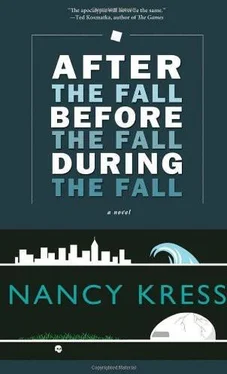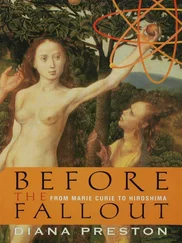At night she dreamed of plants dying, all over the world.
Two more jobs came her way, and she took them both. Around the consulting work she fit a separate, obsessive routine: Wake at 5:00 a.m. Coffee, banishing the lingering night dreams with wake-up caffeine. Care for Alicia. Bundle the baby into her pram and, before the streets of D.C. got too hot, make the long walk to World Wide News to buy newspapers. The Washington Post , the New York Times : the on-line versions left too much out. Also a host of small-town papers. The rest of the day she stayed inside, bathed in the air conditioning that divided her and Alicia from the steaming D.C. summer. She worked and then she read, barely glancing at the wide variety of usual disasters available in the world:
FOREST FIRES OUT OF CONTROL IN BRAZIL
MAN KILLS WIFE, SELF
ECOLOGICAL BALANCE SEVERLY THREATENED BY OVER-GRAZING
ILLEGAL STRIP MINING CAUSES ARMED STAND-OFF WITH LAW
She was looking for something unusual, and she would know it when she found it. No, not “it”—“them.” She searched for two things, and on the first day of July she finally found one of them. Only a small item far inside the Times , bland and inoffensive:
SCIENTISTS SOLVE PLANT MYSTERY
A team of scientists led by Dr. Simon Langford of the U.S. Department of Agriculture announced that the “mystery plague” affecting plants along the Connecticut shoreline has been stopped. “It was a random, natural mutation in one specific microbe,” Langford said, “but relatively easy to contain and kill off with appropriate chemicals. No mystery, really.”
A section of shoreline in the Connecticut Wetlands Preserve has been closed to the public for several days while the botanical correction was carried out. Preserve officials announced that the wetlands will remain closed for the near future, “for further monitoring, as a purely precautionary measure.” Disappointed tourists were turned away by Security personnel but given free passes to other local attractions.
“This sort of thing happens routinely,” Langford concluded. “We’re on top of it.”
“Bullshit,” Julie said aloud to Alicia, who gurgled back.
It was a cover-up—but why? And of what?
Julie knew, or thought she knew, but she didn’t want to know. Not yet. She could be wrong, it was a fancifully dumb idea, in fact it skirted the edges of insanity. Just one of those stray ideas that crossed the mind but meant nothing....
She read the bland article again, then stared out her apartment window at a tree, carefully enclosed in a little wrought-iron fence, growing where a section of city sidewalk had been meticulously removed to accommodate it.
All at once the Grab machinery went crazy.
Ravi was on duty. He and Pete had been talked to by McAllister, a talk that left both of them near tears. She wasn’t angry, she was disappointed. Angry would have been better. Not even Ravi’s sighting of the not-cat outside had deterred McAllister from her disappointment. Pete wasn’t sure that McAllister even believed Ravi. Pete wasn’t sure he did, either. When McAllister was finished with them, Pete and Ravi avoided each other for a week—until Ravi was restored to puffed-up triumph by his amazing Grab.
“I was all ready,” he later told everyone, although Pete had his doubts about that—why even bother to repeat it over and over unless it wasn’t true? And Ravi had a history of falling asleep during Grab-room duty. But whether he had leaped onto the platform at first brightening, or had just barely caught the Grab before it went away, it was irrefutable that Ravi had gone. He had gone close-mouthed both because of McAllister’s scolding and because he was embarrassed by the lack of the teeth that Pete had knocked out, but he returned smiling wide. His shout had reached both the children’s room and the farm. Pete, on crop duty with Darlene, had run toward the Grab room, along with everyone else.
Ravi stood on the platform behind the biggest pile of stuff that Pete had ever seen. It almost hid Ravi; it spilled off the edges of the platform; it clanked and clattered as it fell. Pete couldn’t even identify half of it. How could even Ravi, the strongest of them all, load all this in ten minutes? And onto what?
McAllister, running clumsily behind the bulk of her pregnancy, stopped in the doorway. She went still and white.
“Look what I got!” Ravi shouted. “Look!”
“What is it all?” Caity said. She held a child in each arm. “How did you bring it all?”
“The Grab stayed open for more than ten minutes—for twenty-two minutes! It was a store Grab and I got this big rolling thing—see, it’s under all this—and just piled things on. There only was this kind of stuff, so that’s what I took. But look how much of it!” Ravi practically swelled with pride. Bloated , Pete thought. Like when someone was diseased in their belly.
Why couldn’t Pete have been the one to bring back the big haul? Whatever it was.
McAllister finally spoke. “Twenty-two minutes?”
“I timed it,” Ravi said proudly.
Caity repeated, “What is it all? What’s that thing with the skinny metal spikes coming out of it?”
“A rake,” McAllister said. Then it seemed that once she started talking, she couldn’t stop. “A rake, several hoes, bags of seed and fertilizer, trowels, flower seeds, hoses, flower pots, wind chimes— wind chimes!”
Pete had never seen McAllister like this—wild-eyed, hysterical—not even when he and Ravi had gotten trapped in the funeral slot. Fear pricked him. But the next moment she had recovered herself.
“You were in a garden store, Ravi. And you did well. Let’s get this stuff off the rolling cart so we can get the cart down off the platform. Caity, take Karim and Tina back to the children’s room, and on your way get Darlene to help Jenna with the children. She’ll have to do it because we need you here. Tommy, go wake up Eduardo. Terrell, you and Ravi and Pete start moving this stuff. We need that platform clear right away.”
“Why?” Pete said.
“I don’t know yet. Let’s just do it.”
Caity ran down the corridor with the kids. Pete leaped forward to help unload the platform. If McAllister was ordering Darlene to help with the children, then something important was going on.
They got all the stuff off the platform, including the long, heavy rolling cart. Immediately Terrell jumped on it and Ravi pushed him out the room and down the corridor. Terrell laughed delightedly. “I want a ride, too!” Caity cried, running after the cart.
The platform glowed.
Pete gaped at it. It never brightened again so soon after a Grab—never!
McAllister said, in a voice somehow not her own, “Go.” She handed Pete the wrister that Ravi had turned over to her.
Pete hopped onto the platform, the laughter from the corridor still ringing in his ears.
Julie continued to read the papers obsessively: "STARVATION REACHES CRITICAL POINT IN SOMALIA." "OVERPOPULATION BIGGEST THREAT TO PLANET." But nothing more was mentioned about the mutated bacteria, not anywhere in the world. Nor could she find anything on-line. If the story about K. planticola was being repressed, several countries must be cooperating in doing that, by every means available. The completeness of the suppression was almost as scary as the microbial mutation.
Almost.
Several times she picked up the phone to call Fanshaw’s office. Each time she laid it down again. If there was a cover-up going on, if there really were scientists and covert organizations and high officials in several countries working to keep this from the public, then Julie did not want to call any attention to herself. Fanshaw had probably, given his narcissism, erased any trace of help from anybody else in crafting the article he never got to publish. He would, of course, have preserved her nondisclosure agreement, and Julie could only hope he had it in a safe, secret place. But he had also written her a check “For professional services,” and she had cashed it.
Читать дальше












